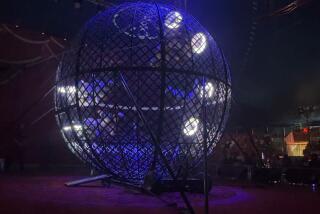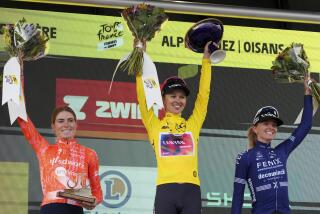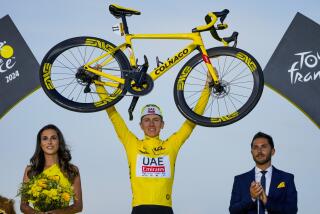Close Encounters of the Tour Kind
KARLSRUHE, Germany — There are no tickets to buy at the Tour de France, no electronic screening system to pass through, no ushers. Fans bring backpacks, coolers and strollers, and as the race passes by, they sometimes jump into the road to wave flags, take photos or throw water on steamy cyclists.
Before each of the Tour’s 21 stages, autograph seekers congregate around team vans. Afterward, riders make a mad dash through narrow streets trying to reach the safe haven of the team van, with admirers in hot pursuit.
For the record:
12:00 a.m. July 13, 2005 For The Record
Los Angeles Times Wednesday July 13, 2005 Home Edition Main News Part A Page 2 National Desk 0 inches; 34 words Type of Material: Correction
Tour de France -- A map in Saturday’s Sports section showed Stage 8 of the Tour de France ending at an elevation of 984.2 feet. Stage 8 finished at an elevation of 2,457 feet.
“The nature of our race is to be open,” Tour director Jean-Marie Leblanc said.
But with the mountain stages -- slow-going climbs where riders are at their most vulnerable -- beginning Sunday, security is once again a matter of concern here.
Before the start of Friday’s stage in Luneville, France, friendly chaos almost turned ugly in front of the U.S. Discovery Channel team bus. A mass of surging fans -- older women and toddlers as well as well-toned young men in their cycling clothes and adoring women with shirts to be signed -- toppled the small barricades that protected Lance Armstrong and his teammates from the clamor.
When the Tour headed into Germany on Friday, spectators were lined 10 deep. Stage 7 winner Robbie McEwen said it felt “almost dangerous” because the crowds were so close.
During a time trial in the Alps last year, Armstrong was spit on, cursed at, shoved and doused with beer as he climbed the 21 switchbacks to the top of l’Alpe d’Huez. The U.S. team had asked for barriers to be set up for the entire length of the climb, but Tour officials refused.
“It was scary. It was out of control,” Armstrong said after winning the stage en route to his sixth consecutive Tour title.
Armstrong fared better in his contact with fans in 2004 than Eddy Merckx did in 1975, when the legendary Belgian champion was punched by a spectator, suffering broken ribs and an injured kidney. Merckx, seeking what would have been a record sixth title, never won another Tour de France.
Armstrong finished 53rd Friday and his lead lead over Discovery Channel teammate George Hincapie stayed unchanged at 55 seconds.
When this year’s riders head into the mountains, their speeds will drop from 30 mph to less than 10 mph. Fans who have often camped for several days to save their spot and who are often fueled by beer and wine want to reach out and touch their favorites.
Fan attacks are not unique to cycling.
In 1993 top-ranked Monica Seles was stabbed in the back while she was resting during a changeover between sets at a tournament in Hamburg, Germany.
At the 2004 Olympics, Brazilian runner Vanderlei de Lima was leading the men’s marathon with about three miles to go when Cornelius Horan, a defrocked priest, tackled him. De Lima got up and continued running but he lost his lead and finished third.
Fans don’t always intend to interfere with Tour competitors.
As a struggling Armstrong began to make a big move in the Pyrenees in 2003, his handlebars became caught on a fan’s bag. Armstrong fell hard but the other leaders, following the sport’s tradition of not taking advantage of a competitor’s misfortune, waited for Armstrong to get up and race. Armstrong went on to win the stage, saying, “The fault was as much mine as the fan’s. I might have been too close to the side.”
Tom Danielson, a member of the Discovery Channel team who won this year’s Tour de Georgia, said the ability to feel the breath of the fans and their touch is integral to the sport.
“Cycling would be dramatically hurt if you took away the fans on the side of the road,” he said. “I think both the riders and the fans would be negatively affected. There is nothing that sends chills down my spine quite like attacking through a crowd of people lined on the side of a mountain finish.
“I guess you could put us in a stadium and build mountains and only show it on TV. I guess then the sport would have another name though.”
Jens Voight, a rider for CSC, who is fourth in the overall standings this year, 1:04 behind Armstrong, agreed.
“If you think of how many races are held around the world, it’s actually quite amazing that we don’t have more accidents,” he said. “There have been some really nasty crashes in the past because of spectators coming too close or stepping out in front of riders. But it’s not often.”
In 1999 Giuseppe Guerini had broken away and taken the lead at the end of a l’Alpe d’Huez stage. With less than three kilometers to go, Guerini collided with a fan who had stepped onto the road to take a photograph. Guerini remounted his bike and won the stage.
“I saw the guy where he was and it was OK,” recalled Guerini, 35, who rides for T-Mobile. “I thought he wouldn’t move but he did and we crashed. For one moment I thought I had lost the most wonderful moment of my career.”
Still, Guerini said, he wouldn’t change the setup. “The fans, they give you heart,” he said.
Christian Vande Velde, of CSC, who rode with Armstrong in 1999 when Armstrong won his first Tour de France, said the most frightened he had been was on a mountain stage in the Giro d’Italia.
“A spectator ran through the peleton taking swings at the riders,” said Vande Velde, 29. “He seemed to be seriously messed up, but it just shows you how easy it is. Yes, it does go through our minds that something bad can happen. Knock on wood, nothing has thus far in my career.”
Jonathan Vaughters, a former teammate of Armstrong’s and the founder of Team TIAA-CREF, the top U.S. developmental cycling team, remembers being escorted by motorcycle policemen carrying sub-machine guns while riding through dangerous areas of the Tour de Colombia in South America.
“But ultimately, you have to trust the fans,” Vaughters said. “I guess that’s hard to say and do these days.”
Tour director Leblanc says there are more than 24,000 police officers protecting the Tour -- they are most obvious at the start and finish areas -- but declines to say any more about security.
Discovery Channel team spokesman Dean Osipow said it has its own extra security with the van, but once the race starts, “There’s nothing more we can do.”
“Ultimately, it’s impossible to guard 120 miles of road every day,” Vaughters said. “That’s a hard thing to do and, yeah, it’s kind of scary. You look at what happened Thursday and you think the Tour is very ripe for some sort of incident.”
Jim Ochowicz, a former racer and head of USA Cycling, said he thinks there’s a reason there have not been more security problems at the Tour.
“It polices itself,” Ochowicz said. “People self-police because they love the sport. You don’t have the hooligans, the rowdies trying to stir up trouble that you see in other sports. You don’t have Jan Ullrich fans fighting Lance fans. It’s not political. It’s not anything except cycling.”
*
(BEGIN TEXT OF INFOBOX)
Tour at a glance
Robbie McEwen of Australia won Stage 7 in 5 hours 3 minutes 45 seconds. Lance Armstrong finished with the same time and maintained his 55-second lead. Overall standings:
*--* 1. Lance Armstrong, United States Discovery Channel, 23:01:56 2. George Hincapie, United States Discovery Channel, 55 sec. behind 3. Alexandre Vinokourov, Kazakhstan T-Mobile, 1:02 behind 4. Jens Voigt, Germany CSC, 1:04 5. Bobby Julich, United States CSC, 1:07 6. Jose Luis Rubiera, Spain Discovery Channel, 1:14 7. Yaroslav Popovych, Ukraine Discovery Channel, 1:16
*--*
**
STAGE 7 AT A GLANCE
*--* * Stage: A 142-mile run from the eastern French town of Luneville to Karlsruhe, Germany. Heavy rain made for slippery roads and several riders fell. * Winner: Robbie McEwen, Australia, Davitamon-Lotto, in 5 hours 3 minutes 45 seconds. * How others fared: Jan Ullrich, Germany, T-Mobile, finished 45th; Lance Armstrong, United States, Discovery Channel, finished 53rd; Alexandre Vinokourov, Kazakhstan, T-Mobile, finished 65th. All were accorded the same time as McEwen. * Yellow jersey: Armstrong retains the overall lead. * On the web: For more information on the Tour de France, including Diane Pucin’s blog, photo galleries and up-to-the-minute standings, please visit latimes.com/tour.
*--*
*--* STAGE 7 RESULTS 1. Robbie McEwen, Australia 5:03:45 2. Magnus Backstedt, Sweden 5:03:45 3. Bernhard Eisel, Austria 5:03:45 4. Gerrit Glomser, Austria 5:03:45 5. Baden Cooke, Australia 5:03:45
*--*
More to Read
Sign up for Essential California
The most important California stories and recommendations in your inbox every morning.
You may occasionally receive promotional content from the Los Angeles Times.










